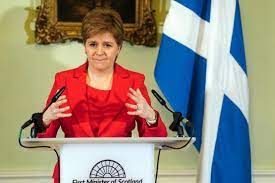Tim Stanley
The SNP leadership race ends today and many think Unionism is the real winner: Labour is catching up in the polls. But don’t count your chickens. Nicola Sturgeon has won eight out of eight elections by shifting Scotland’s imagination in her favour. Her clever package of party discipline, nationalism and progressivism only unravelled in the past few months. First, the UK Supreme Court effectively blocked another referendum, closing the clearest path to independence. Second, her Gender Recognition Reform Bill came a cropper, undercutting the idea that Scottishness is inherently more woke than Englishness. It’s quite remarkable that two out of the three leadership candidates have criticised Sturgeon’s pro-trans agenda.
Humza Yousaf, the doe-eyed continuity candidate, initially embraced the Reform, but even he has wavered – and shot himself magnificently in the foot by declaring that prisoner Isla Bryson is not trans at all but merely “at it”. A concerned citizen telephoned the police. It seems that by misgendering Isla, Humza contradicted the Hate Crime and Public Order Act 2021, a piece of legislation that was introduced by a naive young justice minister called?… Humza Yousaf. The SNP looks like several parties in one. Humza wants to make independence compelling by promising social justice. Kate Forbes, a pro-business Calvinist, wants to make it credible. And Ash Regan emphasises achieving independence through any democratic means possible. Some of her supporters dismiss Yousaf and Forbes as “home rule” nationalists, no longer trying to break away from the UK but to monopolise devolved government instead.
Of course, if that were the goal then the one snag is that the SNP is absolutely rotten at governing. In the interests of fairness, I’ll let the leadership candidates speak for themselves. During one debate, Forbes said to Humza: “You were a transport minister and the trains were never on time, when you were justice secretary the police were stretched to breaking point, and now as health minister, we’ve got record high waiting times.” “Apart from that,” as Mrs Lincoln once said, “the play was quite good.”
It is bizarre, considering they can’t get the basics right, that the SNP has splashed money on gimmicks such as the “baby box”, which every new family can receive regardless of income. The box not only includes clothes, mittens, a blanket – oh, and a packet of condoms – but is designed so that it can be used as a literal cot, apparently on the assumption that all Scots live in 15th-century levels of ignorance and poverty. The SNP likes to stress that the idea comes from Finland (as do Scotland’s disastrous education reforms) hinting that the nation is closer in spirit to Scandinavia, where everyone is equal, than England, where we rock our babies to sleep in old tyres. Sturgeon has also tried to tweak taxes to make them Swedishly redistributive. Just.
Under her new code, 52 per cent of Scots pay less in rates than they would in England, to the tune of a whopping £22. But if you earn £50,000 a year, you pay an extra £1,552. It’s unclear what the money is being spent on. Funding to local government has been squeezed. The result: Glasgow has just announced it is slashing nearly £22?million from health and social care, including the loss of 197 jobs. North Lanarkshire council had to axe all its secondary school librarians. One might argue that this is a by-product of the nationalist mission. To build loyalty to the national one has to weaken loyalty to the local. That way people will identify not with regional traditions or sources of authority but with new state institutions that seem to make independence viable, perhaps inevitable – or even give the impression that it is already happening. Hence, Scotland’s eight police forces have been merged into one, as have its fire brigades, and the SNP has agitated to take control of the transport police. The Nats want to create a new social care service.
The baby box is only an eccentric example of an effort to establish a direct relationship between the individual and emerging state, to nudge people into thinking as part of a distinct polity. The new Scotland is communitarian: hence Sturgeon took stricter anti-Covid measures faster than England. The new Scotland is Remainer: hence the EU flag is flown at Holyrood even though the UK is no longer in it. The official “guidance for flag flying on Scottish Government buildings” states that “the Saltire, European and Ukrainian flag should be flown every day from St Andrew’s House”. There is only one “event” day each year when the Union flag must be flown on government buildings. The pride flag has four.
If devolved government has been transformed into a theatre of nationalism, much of the audience appears to have nodded off. In 2014, 45 per cent of Scots voted for independence; according to YouGov, the figure today would be around 46 per cent. But among 16-24-year-olds, it’s 61 per cent, and a majority for the Union only emerges within cohorts over 50. Britishness, like Conservatism south of the border, appears to be dying out. The SNP dominates the imagination not just because it has a positive sense of identity but because it has a sense of identity at all. Post-God and post-socialism, there are few major contenders for the soul of Britain (the SNP has absorbed wokery and the ecology), and Britain itself is attacked constantly as a racist project cooked up by Tory elites. The SNP’s anti-Unionism is validated by Left-wing British culture.
If pro-Unionism hinges entirely on being anti-SNP – well, that’s a game that Remain played in 2016 and lost horribly. So, nationalism might be going through a bad patch, but no one is selling a Romantic Unionist alternative, a fault that lies in part with the low quality of leadership. There are precious few Donald Dewers, Teddy Taylors or even Gordon Browns anymore. By contrast, one has to admire the abilities of Nicola Sturgeon, who over the past decade has always exhibited composure, self-discipline and authority. I’ve lost count of the number of times I wished she was on my side.
The Telegraph







